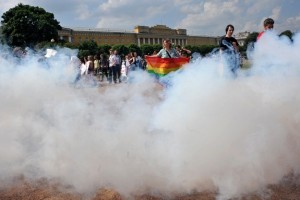pussy riot and russia’s LGBTIQ crisis
In the last week, more than 100 famous musicians including Madonna, Elton John and Sting have called for Russia to release the two members of feminist punk-rock band Pussy Riot still jailed for an anti-government protest performance.
This high-profile campaign represents a growing international focus on Russia’s human rights record, a record that has been darkened most recently by violence towards marchers at the 2013 Gay Pride rally with dozens of people arrested.
Russia decriminalised homosexuality in 1993. This was a necessity in order to join the Council of Europe. Clearly though, general public opinion on the issue remains negative.
The Pussy Riot protests that occurred last February 2012 came at a time where thousands of people were marching in the streets against Vladimir Putin’s re-election to power. Mr Putin became President in March last year, and since then protests have decreased.
Pussy Riot’s Yekaterina Samutsevich was released last October. Nadezhda Tolokonnikova and Maria Alyokhina remain in prison colonies, despite Ms Tolokonnikova’s requests to defer her sentence until her 5-year old daughter is older.
This week Pussy Riot released their first clip since the jailing of three members last August. In the video, as they pour oil on a large photo of Igor Sechin, chairman of state oil giant Rosneft, they shout ‘Homophobic reptile – get out of history.’
American organisation, Human Rights First, documents an increase in hate violence throughout the Russian Federation over the past decade. This is the worst hate crime murder rate in Europe, and extends to racially motivated attacks as well as those based on sexuality.
During a period of extreme violence in December 2010, Mr Putin was serving as Prime Minister. He strongly condemned the racial attacks and unrest, but no arrests followed nor were any tangible improvements made.
Jump forward three years, and Mr Putin, now serving as President, has signed into law a ban on the adoption of Russian children by gay and lesbian couples.
He has also approved a provision for 14 days detention for tourists and foreign nationals suspected of being homosexual, lesbian, or pro-gay rights, and instigated heavy fines for providing information about homosexuality to people under 18 years of age.
Broadway icon, Harvey Fierstein, the voice of Tracy in Family Guy, launched a blistering attack on the Russian president in the New York Times opinion pages this week. Fierstein wrote that Mr Putin, ‘has declared war on homosexuals,’ and condemned the actions taken by Russian authorities. Fierstein also believes that Mr Putin’s real agenda is to develop homophobia into an issue large enough to distract from failing policies elsewhere in the nation state.
The actions of Mr Putin and the Russian government are already drawing international criticism from human rights groups. It will be interesting to see what comes to
light when Russia hosts the Winter Olympics next year, especially because under current legal frameworks any Olympic athlete, trainer, the media representative, or spectator, can be detained for a fortnight if suspected of being gay or lesbian.
Even the Russia Orthodox Church has come out to condemn discrimination against sexual minorities. Patriarch Kirill met with the Secretary General of the Council of Europe, a pan-European human rights body, in Moscow, and said that whilst the church considered homosexuality to be a sin, ‘We respect the person’s free choice, including in sex relations.’
But as Pussy Riot continues their protest, including against the increasing power and proximity of the church and state, these comments may be the exception to the rule.
In a rare appearance on 60 Minutes, a Pussy Riot member in hiding gives an interview in a red balaclava with holes for her eyes and mouth. In translation she tells the interviewer, ‘I’m here to say you shouldn’t give up. What happened to us is unacceptable.’
There will be plenty to watch in the coming months as internal voices of dissent and appeal for social reform are beamed globally, and campaigns such as the musicians calling for the release of Pussy Riot continue to grow.
Would the new laws prevent you from going to Russia? Should Australia boycott the Winter Olympics in Sochi, Russia? Let us know in the comments below!



God, this is depressing. But it would be interesting to gain an understanding of how much public support Putin’s policies have, outside of strictly left-wing groups. I think the broader trend of homophobia may be the issue here, as well as Putin’s political goals…
Pingback: feminist news round-up 28.07.13 | lip magazine